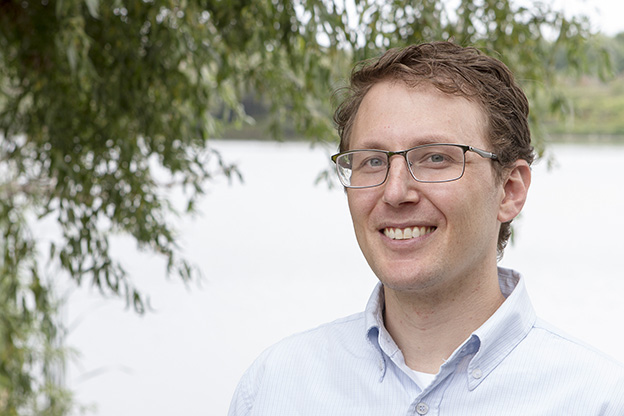New network to help experts solve world’s water woes

Dustin Garrick's mandate is to create a multidisciplinary research and teaching network connecting water scholars, both at McMaster and internationally, to tackle some of the most pressing water-related policy issues facing the globe today.
Dustin Garrick is focused on solving problems.
In fact he’s spent his career solving problems related to one of the world’s most precious resources: water.
“There’s lots of discussion of a global water crisis, but the crisis takes different forms around the world,” says Garrick. “Here in our backyard, it’s dealing with water pollution and threats to the environment; in southern India, it’s access to safe drinking water supplies; in places like California, it’s drought and impacts on agriculture and food security. But the common thread is the need for interdisciplinary approaches to solve these problems.”
And that’s exactly what Garrick is at McMaster to do.
Earlier this year, Garrick arrived at McMaster from the University of Oxford to become the Philomathia Foundation Professor in Water Policy and Research, a joint appointment between the Faculties of Social Sciences and Engineering.

His mandate is to create a multidisciplinary research and teaching network connecting water scholars, both at McMaster and internationally, to tackle some of the most pressing water-related policy issues facing the globe today.
“The benefit of the network is that we can harness our science to help solve society’s problems around water,” says Garrick. “Many water researchers at McMaster are on the leading edge of their fields, from biology and political science to engineering and humanities. We want to bring that capacity together to deliver an impact both locally and globally.”
Garrick says it is imperative to link the latest scientific advances with public policy and this will be the focus of the network.
“When we see new scientific or technological breakthroughs, it’s often a challenge to implement those and make sure they reach the people who can benefit from them,” says Garrick, “We need to connect our research with decision makers in government or business who are in the position to invest and actually deliver those benefits to society.”
According to Garrick, McMaster is well positioned to become a leader in water policy.
Over the past 10 years, McMaster has received $22 million in tri-council funding for water research and has already developed a number of partnerships both in Canada and globally. Partnerships span from Bay Area Restoration Council and the City of Hamilton to the University of Oxford and Global Water Partnership.
Garrick says, consistent with the principles of Forward with Integrity, McMaster has a strong collaborative research culture and a well-earned reputation for research intensity, making it an ideal place to develop an interdisciplinary research network.
Currently, more than fifty faculty members and hundreds of students from a number of disciplines are engaged in this research. Garrick has spent the better part of the year connecting with many of these researchers to understand their areas of interest. The idea is to develop research “clusters” in strategic areas that address major challenges, such as climate change adaptation, safe drinking water and public health.
“We want to incorporate this expertise into a strategic approach that everyone could see themselves being a part of,” says Garrick. “We want to focus on areas where we’re making a difference or where we could make a difference if we work together.”
“Water doesn’t respect international boundaries”
Garrick says international engagement is critical to the development of water policy and through the network, is seeking to develop global partnerships and collaborations.
He recently traveled to Stockholm where he presented his work on water security as part of an international task force convened by the Organization for Economic Cooperation and Development (OECD) and Global Water Partnership.
Learn more about Water Week
Oct. 6 – 10
A week of events for students, faculty and the community to promote water research, teaching and engagement
#macwaterweek
“Canada is not alone in dealing with the global water crisis,” says Garrick. “The goal of the international focus is to develop better ways of learning from areas around the world with similar water challenges. We don’t need to recreate the wheel when others have already been experimenting. It’s also an opportunity to share Canada’s lessons with the world.”
In the meantime, Garrick is focused on continuing to build the network within McMaster and on connecting with faculty and students, whom he calls, “the next generation of leaders,” by creating opportunities for ongoing engagement, opportunities like McMaster Water Week, taking place October 6 – 10.
“We hope the events we have planned for Water Week will spark a dialogue around water-related issues, help broaden involvement with the network and also help showcase the breadth, depth and diversity of McMaster’s teaching and research capacity on water.”
